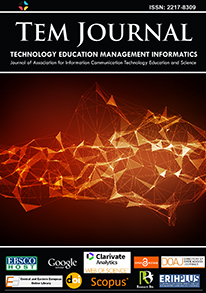How do Math Anxiety and Self-Confidence Affect Mathematical Problem Solving?
How do Math Anxiety and Self-Confidence Affect Mathematical Problem Solving?
Author(s): Reny Wahyuni, Dwi Juniati, Pradnyo WijayantiSubject(s): Education and training, Sociology of Education
Published by: UIKTEN - Association for Information Communication Technology Education and Science
Keywords: Math anxiety; self-confidence; problem solving; mix method
Summary/Abstract: Problem-solving performance requires both cognitive and affective aspects related to math anxiety and self-confidence. This study aims to determine the effect of math anxiety and self-confidence on geometry problem-solving skills and then explore students' geometry problem-solving based on their level of math anxiety and self-confidence. This study utilized a mixed-methods approach with a sequential explanatory design and involved 106 students. The quantitative portion of the study employed a multiple linear regression test to examine the influence of math anxiety and self-confidence on problem solving. Furthermore, qualitative research was done to thoroughly examine the effect through in-depth interviews. The results demonstrate that math anxiety and self-confidence influenced geometry problem-solving (R = 0.476; p = 0.000) and contributed 22.6% based on the value of R-square. Furthermore, the present study also found differences in the performance of a subject with low math anxiety and high self-confidence and a subject with high math anxiety and low self-confidence.
Journal: TEM Journal
- Issue Year: 13/2024
- Issue No: 1
- Page Range: 550-560
- Page Count: 11
- Language: English

